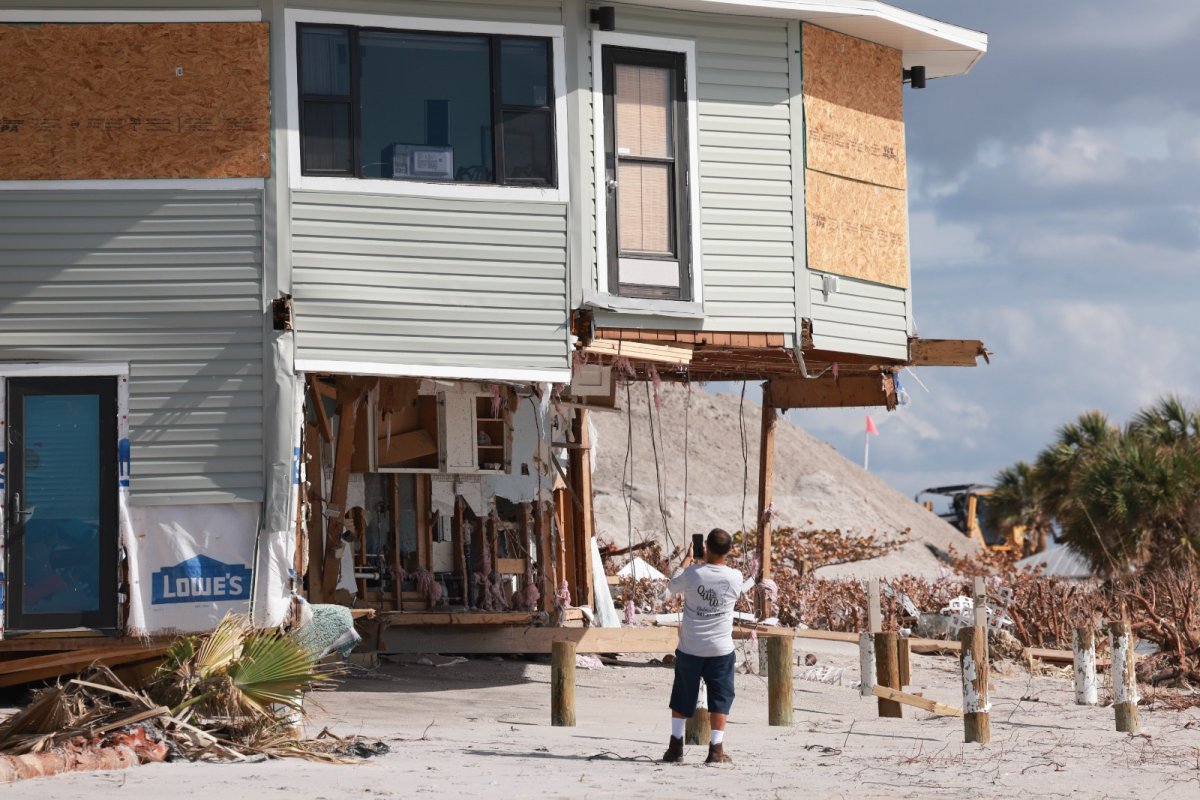In the weeks following the devastation caused by Hurricanes Helene and Milton to the state's west coast, Florida homeowners are trying to cut their losses by selling their damaged or damage-prone properties "as is" or for "cash only," according to reports.
Ali Linville, a St. Petersburg resident, told ABC Action News that after witnessing the back-to-back hurricanes between the end of September and early October, she is now desperately trying to sell her home. "I just want to leave," she told the news company. "Once you've had it done three times, it's like, 'OK, I've had enough.'"
Helene and Milton are estimated to have caused tens of billions of dollars in damages in Florida. The Florida Office of Insurance Regulation (FLOIR) calculated that, as of November 1, there have been a total of 58,834 claims for residential properties made to Florida insurers in relation to Helene alone. Of these, 23,942 have been closed without payment—meaning that the homeowners who made the claims won't receive any money for them.
The numbers are even more dramatic for Milton. According to the FLOIR, a total of 215,051 claims have been reported with Florida insurer in relation to the hurricane, of which 27,736 were closed without payment.
With its 700 miles of shoreline, the Tampa Bay region, where Linville and about 3 million residents live, is an area at high risk for hurricane damage—something people living there are becoming painfully aware of. And yet, the region is extremely popular.

Despite the vulnerability of the area to natural disasters and flooding, Tampa Bay is the most densely populated area in the entire Sunshine State—a factor that increases the amount of damage the region can suffer when hit by a powerful storm.
More severe and more frequent extreme weather events like hurricanes, a phenomenon that scientists have linked to climate change, are swaying residents toward moving out. Linville told ABC Action News that she is now trying to sell her home for $425,000—less than the $575,000 she paid in 2021—just to get rid of it and "cut her losses."
The St. Petersburg resident told the news company that her house has flooded three times in just two years, and her asking price is now a reflection of the repairs the property needs. Her home is a four-bedroom, two-bathroom property in Shore Acres.
According to Redfin, the median sale price of a home in Shore Acres was $452,000 in September—down 23.4 percent from a year earlier. A home in the area typically stays on the market for 63 days before going under contract, according to the brokerage company, up from 23 days only last year. Normally, a listing is considered "stale" if it remains on the market for longer than a month without being sold.
Newsweek contacted the National Association of Realtors, Florida Realtors and Redfin for comment by email on Monday morning.
The FLOIR told Newsweek that there are many reasons why a claim may be closed without payment. "The most common reasons for a closed claim without payment is not meeting the deductible, or being a claim for flood damage which is not generally covered under a homeowner's insurance policy," a spokesperson for the company said.
"Other reasons include, but are not limited to, the consumer withdrawing the claim or the insured not being reachable to adjudicate the claim."
A claim closed without payment would later be reopened if the circumstances change, and "a consumer seeking coverage through the National Flood Insurance Program [NFIP] often has to produce a denial letter from a traditional property insurance carrier, even if they are fully aware that their property insurance does not cover flood damage, or they may not have traditional homeowner's insurance at all, before they are eligible for coverage through the NFIP," a spokesperson for the FLOIR specified.
Are you a Florida homeowner trying to sell a property in a hurricane prone area or a damaged home? How are you handling the situation and trying to cut your losses? Contact g.carbonaro@newsweek.com.




















 English (US) ·
English (US) ·